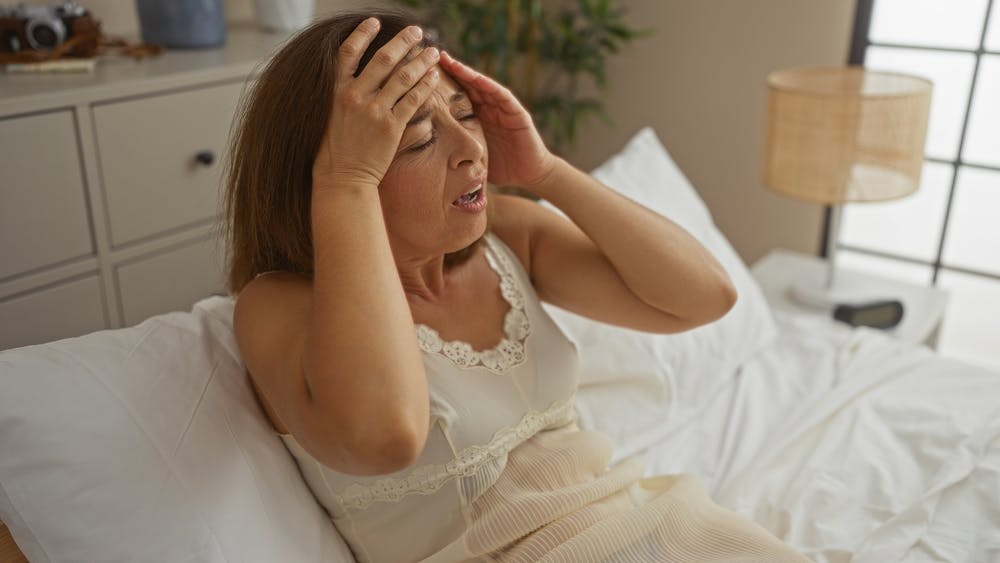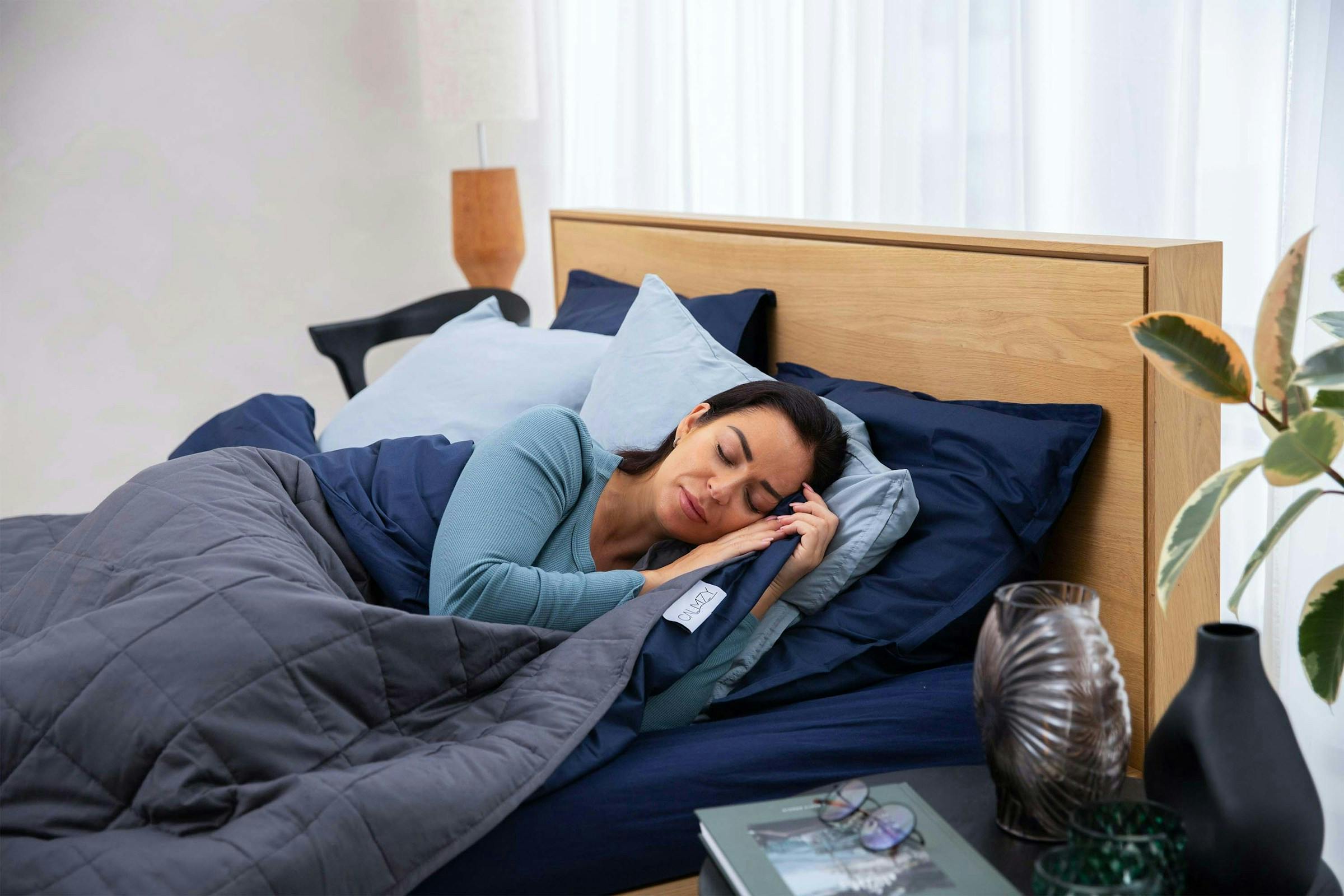Hot Flashes and Headaches: What’s the Connection and How to Find Relief
By Dr. Priyali Singh, MD
Reviewed by Dr. Daniel Uba, MD
Published Jun 26, 2025
9 min read

If you're going through perimenopause or menopause, you may already be familiar with hot flashes—those sudden waves of heat that can take over your body and leave you drenched in sweat. But if you’re also experiencing more frequent headaches during this time, you’re not alone. Many women report that their headaches seem to increase or change right around the same time hot flashes begin. So, what’s really going on?
In this article, we’ll explore the surprising connection between hot flashes and headaches. We’ll break down the science in a simple way, talk about why it happens, who’s most affected, and—most importantly—how to find relief. Whether you’re in your 40s, 50s, or beyond, this guide is for you.
What Are Hot Flashes and Why Do They Happen?
Hot flashes are one of the most common symptoms of menopause. They’re also one of the most noticeable—and often the most frustrating. A hot flash can feel like a sudden burst of heat that starts in your chest or face and spreads throughout your body. You may start sweating, feel your heart racing, and even experience a sense of panic or anxiety. Some hot flashes are mild and pass quickly, while others can be intense and last several minutes.
The reason hot flashes happen has everything to do with hormones, especially estrogen. As women enter perimenopause, the years leading up to menopause, estrogen levels begin to rise and fall in unpredictable patterns. Eventually, estrogen levels drop for good, triggering menopause, which officially begins 12 months after your last period.
But estrogen isn’t just a reproductive hormone. It plays a role in many areas of your body, including your brain’s temperature regulation system. When estrogen levels drop, your brain becomes more sensitive to even tiny changes in body temperature. That sensitivity is what causes the chain reaction of a hot flash—your brain thinks you’re too hot, even if you’re not, and signals your body to cool down by sweating and widening your blood vessels.
What Kind of Headaches Are Linked to Hormonal Changes?
Headaches aren’t new to most women. In fact, more women than men suffer from headaches and migraines throughout their lives. And one major reason for that is hormones, particularly estrogen.
There are a few different types of headaches that may show up during perimenopause and menopause:
- Tension headaches, which feel like a tight band around your head.
- Migraines, which are often more intense, may come with nausea or light sensitivity, and can last for hours or even days.
- Hormonal headaches, which are triggered by fluctuations in estrogen levels.
Hormonal headaches tend to follow a pattern. You might have noticed them before your period during your reproductive years. That’s because estrogen drops right before menstruation, which can trigger headaches or migraines in some women. During perimenopause and menopause, these estrogen shifts become more extreme and less predictable, which can make hormonal headaches more frequent or severe.
Even women who’ve never had migraines before might start getting them during this time.
How Hot Flashes Can Trigger Headaches
So how are hot flashes and headaches connected? One key word: stress.
When your body experiences a hot flash, it’s not just about feeling warm. It sets off a physical stress response. Your heart rate increases, your blood vessels change size, and your brain reacts by trying to cool the body down. This can leave you feeling exhausted or overstimulated, especially if you’re having several hot flashes a day or waking up with night sweats that disturb your sleep.

Here’s how that can lead to a headache:
- Sleep Disruption: If hot flashes wake you up at night, the resulting poor sleep can make you more prone to headaches the next day. Sleep deprivation is a well-known trigger for both tension headaches and migraines.
- Dehydration: When you sweat heavily during hot flashes and don’t drink enough water to replace lost fluids, dehydration can occur. Dehydration is another common headache trigger.
- Stress and Anxiety: Hot flashes often come with anxiety or a sense of unease. This mental stress can tighten muscles and constrict blood flow, setting off a tension headache or migraine.
- Blood Vessel Changes: Estrogen affects the size and flexibility of blood vessels. During a hot flash, your blood vessels may dilate quickly, which can impact the way blood flows to the brain—another possible headache trigger.
It’s a perfect storm: fluctuating hormones, poor sleep, and body stress all wrapped into one. That’s why many women report that headaches and hot flashes seem to appear hand-in-hand during menopause.
RELATED READ: What Causes Night Sweats in Men? 10 Common Reasons and How to Find Relief
What Science Says About the Link Between Hot Flashes and Headaches
While there’s still a lot to learn about this connection, research has started to uncover some interesting findings. One study published in the journal Menopause found that women who experienced more frequent hot flashes were also more likely to report migraines. Another study noted that women with a history of menstrual migraines were at higher risk of experiencing migraines during the menopausal transition.
Scientists believe that the brain’s temperature regulation center—called the hypothalamus—may be especially sensitive to estrogen levels. When estrogen levels drop, the hypothalamus may become overactive, triggering hot flashes and potentially playing a role in headache development.
There’s also emerging evidence that some women may be more sensitive to hormonal changes than others. If you’ve always been prone to hormonal shifts—like PMS, postpartum mood swings, or cycle-related migraines—you may be more likely to experience hot flashes and headaches during menopause.
Still, more large-scale research is needed. But the link is becoming clearer: hot flashes are more than just heat—they’re part of a bigger hormonal puzzle that can affect your head, mood, and overall well-being.
Are You at Higher Risk?
Not every woman will experience headaches during menopause. Some sail through it with only minor symptoms, while others feel like their body is going haywire. But certain factors can increase your chances of experiencing both hot flashes and headaches:
- You had migraines before: If you’ve dealt with migraines at any point in your life—especially menstrual migraines—you’re more likely to have them during perimenopause.
- You’re under chronic stress: High stress levels can make your symptoms more intense and more frequent.
- You have poor sleep habits: If you regularly sleep less than 6 hours, or have interrupted sleep, you’re more prone to both hot flashes and headaches.
- You smoke or drink alcohol regularly: Both can worsen hormonal symptoms.
- You’re in early or surgical menopause: Women who enter menopause early or go through it suddenly (due to hysterectomy or chemotherapy) often experience more intense symptoms.
If you check more than one of these boxes, it’s even more important to be proactive about managing your symptoms.
How to Manage Hot Flashes and Headaches Together
The good news is that once you understand the connection, you can take practical steps to manage both symptoms at the same time. It may take a little trial and error, but many women find relief with a combination of lifestyle changes, natural remedies, and medical support.

Start with the basics:
Hydration is key. Drink plenty of water throughout the day, especially if you’re sweating from hot flashes. Staying hydrated can help prevent headaches and improve energy levels.
Cool your body. Keep your environment cool, especially at night. Use fans, wear light pajamas, and avoid heavy blankets. During the day, dress in layers so you can adjust quickly.
Reduce stress. Try mindfulness, breathing exercises, yoga, or light walks. Anything that calms your nervous system can help reduce both hot flashes and headache frequency.
Eat to balance hormones. Avoid processed sugar, caffeine, and alcohol, which can all make hot flashes and headaches worse. Focus on whole foods—leafy greens, healthy fats, lean proteins, and plenty of fiber. Some women also find relief from foods rich in magnesium (like almonds and spinach), which may reduce migraine severity.
Track your symptoms. Keeping a journal can help you spot patterns. You might notice that headaches tend to follow poor sleep or days with more hot flashes. This kind of insight can help you adjust your habits or talk to your doctor more effectively.
Medical Treatments That May Help
If lifestyle changes alone aren’t cutting it, don’t worry—there are other options. Talk to your healthcare provider about medical treatments that may address both hot flashes and headaches.
Hormone Replacement Therapy (HRT) is one of the most effective treatments for menopausal symptoms. By stabilizing estrogen levels, HRT can reduce hot flashes and may also help decrease hormonal headaches or migraines. However, HRT isn’t right for everyone, especially women with certain health conditions like a history of breast cancer or blood clots.
Other non-hormonal options include:
- SSRIs and SNRIs: These antidepressants are sometimes prescribed off-label to reduce hot flashes and have been shown to help with some types of chronic headaches.
- Anti-migraine medications: If you’re experiencing severe migraines, your doctor may suggest triptans, beta-blockers, or other preventive therapies.
- Natural remedies: Some women find relief with supplements like black cohosh, evening primrose oil, or magnesium glycinate. Always talk to your doctor before starting a new supplement, especially if you’re taking other medications.
- Acupuncture: Emerging research suggests it may help some women with hot flash severity and frequency, as well as reduce headache pain.
RELATED READ: Keto Headache: What It Feels Like, Why It Happens, and How to Get Relief Fast
Can You Prevent These Symptoms from Getting Worse?
While you may not be able to stop menopause from happening, you can take steps to make the journey easier. Prevention starts with awareness and consistency.
Make sleep a priority. Go to bed and wake up at the same time each day, avoid screens at night, and create a cool, calm bedroom environment.
Get regular exercise. It helps regulate hormones, improve sleep, reduce stress, and improve blood flow—all of which can keep both hot flashes and headaches in check.
Stay in touch with your healthcare provider. If your symptoms are affecting your quality of life, don’t try to tough it out alone. There are many treatments available, and the right one can make a huge difference.
Conclusion
Hot flashes and headaches are both common symptoms during the menopause transition, and for many women, they show up together. While it can be frustrating, understanding the connection between them—especially the role of estrogen, stress, sleep, and temperature regulation—can help you feel more in control.
You’re not imagining things. There’s a real link, and more importantly, there are real solutions. Whether it’s drinking more water, managing stress, exploring HRT, or trying new supplements, small steps can add up to major relief. And remember: you don’t have to suffer in silence. Help is out there, and relief is possible.
Share this article

10 Benefits of Sermorelin for Women: Sleep, Fat Loss & Energy
Dr. Priyali Singh, MD
Feb 11, 20265 min read

Lowest Progesterone Dose for HRT: 100 mg, Safety, and Expert Guidance
Editorial Team
Feb 11, 20264 min read

Hormonal Health Statistics for Women (2026): A Comprehensive Medical Overview
Lilian E.
Feb 10, 20267 min read

Best-in-class care is a click away
Find everything and everyone you need to reach your metabolic health goals, in one place. It all makes sense with Meto.
Join Meto